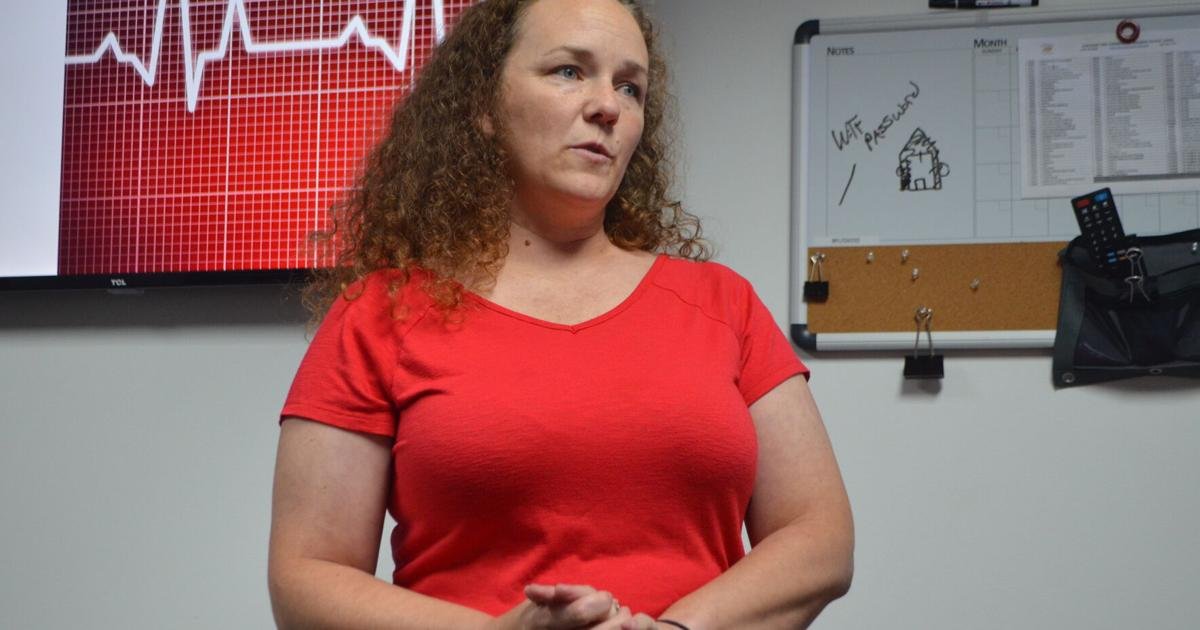Mend the Line, a non-profit organization dedicated to eliminating the stigma of mental health in the emergency medical community, hosted an awareness program at the London Fire Station on Tuesday, June 25th.
The program, “First Responders: Eliminating the Stigma of Mental Health,” featured speakers and slideshow presentations from President Sonia Kirkpatrick, a licensed clinical social worker, and Mike McCurdy, a firefighter, paramedic and military veteran.
Kirkpatrick entered the field after eight years of education in 2000. After working for Laurel County Ambulance Company in London for several years, he moved to Florida where he worked as a paramedic before returning to Laurel County where he tragically suffered a career-ending knee injury.
Kirkpatrick was 21 when she began her career, and she spoke about the impact the job had on her at such a young age, sharing a personal story about the trauma she experienced.
“Nobody told me I’d be on the side of the road searching for limbs after an accident, but there I was,” Kirkpatrick said.
Kirkpatrick explained that traumatic events experienced by emergency responders under the age of 25 still qualify as childhood trauma because their brains are not yet fully developed.
The Adverse Childhood Experiences (ACE) test is a short test that rates an individual’s level of trauma on a 10-point scale, and emergency workers’ scores are similar to those of inmates. Kirkpatrick himself scored a 9 out of 10.
McCurdy also said his career had left him suffering from post-traumatic stress disorder.
“I don’t have time to recover because I have to go to another job,” he said.
Paramedics experience more trauma on a daily basis than most people will experience in their entire lifetime, so PTSD and suicidal thoughts are huge possibilities and concerns for those working as paramedics.
For example, while the general population experiences one to three traumatic events in their lifetime, police officers experience an average of three traumatic events per six months of their employment, amounting to 120 events over a 20-year period.
Additionally, there are several factors that prevent emergency personnel from seeking help when they are suffering as a result of a traumatic experience. Some examples include unpredictable work schedules, fear of losing their status or firearms, being seen as weak by coworkers, feeling that their masculinity and competence are threatened, and the cost of services such as therapy.
Fortunately, paramedics can receive 100% reimbursement through the Kentucky State Fire Commission for any general copays, inpatient or outpatient treatment copays, or drug copays associated with work-related stress disorders.
The process for receiving reimbursement is as simple as the doctor or therapist involved helping the first responder fill out paperwork attesting to the individual’s diagnosis. Notably, the contact remains confidential.
They cited long working hours, being unable to attend family events, disrupted sleep patterns, difficulty dealing with minor stressors, repeated exposure to trauma, burnout and drinking alcohol to cope with work challenges as some of the concerns paramedics face.
Kirkpatrick said paramedics who care about their colleagues should familiarize themselves with the warning signs, be aware of local resources, conduct regular “peer checks” and hold debriefings after major incidents.
McCurdy spoke about how he had developed self-destructive tendencies, chief among them being his reliance on alcohol to dull his pain.
Alcohol is involved in 85% of police suicides.
Career firefighters report drinking alcohol about half of the time off duty. Additionally, about 50% of male firefighters report heavy or binge drinking in the past month, and 9% report driving while intoxicated.
Additionally, Kirkpatrick and McCurdy found that paramedic statistics are often lower than the actual rate because paramedics often lie about their struggles out of fear.
Living proof that improving mental health is possible, McCurdy has now been sober for over five years. He encourages people to keep a journal after their emergency runs and to reflect on the situation with colleagues.
Kirkpatrick and McCurdy also received stellate ganglion block (SGB) injections, which immediately and significantly improved their mental well-being. Although the injections were originally designed to relieve chronic physical pain, they proved to offer more than just physical treatment, as injured veterans began reporting mental improvements as well.
Firefighters may be able to get full coverage for the vaccine if they have been diagnosed with PTSD and are seeing a therapist, even though insurance won’t cover the $600 cost.
Other proven treatments include cognitive behavioral therapy (CBT), cognitive processing therapy (CPT), exposure therapy, accelerated resolution therapy (ART), narrative exposure therapy (NET) and eye movement desensitization and reprocessing (EMDR) therapy, with Kirkpatrick saying EMDR therapy works best for emergency personnel.
Available resources include the PTSD Foundation of America, which can be contacted at 877-717-PTSD, and the Substance Abuse and Mental Health Services Administration (SAMSHA), which can be contacted at 800-662-HELP.
The All Clear Foundation has also partnered with the Crisis Text Line to provide confidential support exclusively for emergency responders. To access the line, text “BADGE” to 741741.
For more information about Mend the Line’s work, visit mendthelineky.org.

